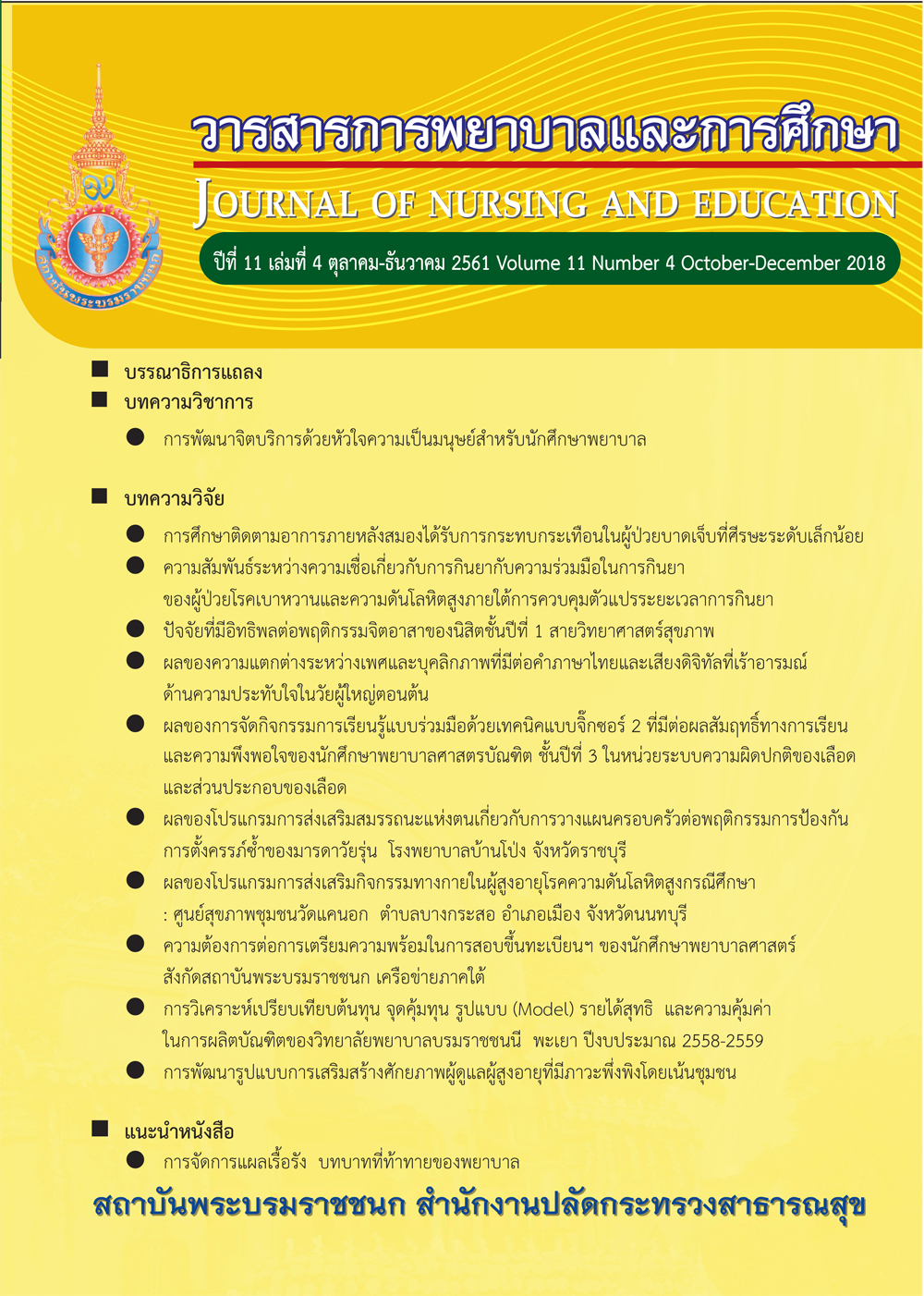ปัจจัยที่มีอิทธิพลต่อพฤติกรรมจิตอาสาของนิสิตชั้นปีที่ 1 สายวิทยาศาสตร์สุขภาพ
Factors Influencing to Volunteering Behaviors of 1st Year Health Science Students
คำสำคัญ:
พฤติกรรมจิตอาสา, วิทยาศาสตร์สุขภาพ, ทฤษฎีการเรียนรู้ทางสังคมบทคัดย่อ
การวิจัยเชิงพรรณนานี้มีวัตถุประสงค์เพื่อศึกษาปัจจัยที่มีอิทธิพลต่อพฤติกรรมจิตอาสาของนิสิตชั้นปีที่ 1 สายวิทยาศาสตร์สุขภาพ กลุ่มตัวอย่างเป็นนิสิตชั้นปีที่ 1 ของคณะต่างๆที่ศึกษาในสายวิทยาศาสตร์สุขภาพจาก คณะพยาบาลศาสตร์ คณะแพทยศาสตร์ คณะเภสัชศาสตร์ คณะทันตแพทยศาสตร์ และคณะกายภาพบำบัด จำนวนกลุ่มตัวอย่างเท่ากับ 245 คน การคัดเลือกกลุ่มตัวอย่างเป็นการสุ่มแบบชั้นภูมิ เครื่องมือที่ใช้ในการวิจัย ประกอบด้วย 1) แบบวัดพฤติกรรมจิตอาสา ความเชื่อมั่น = 0.85 2) แบบวัดการรับรู้ความสามารถของตน ความเชื่อมั่น = 0.89 3) แบบวัดเจตคติอาสา ความเชื่อมั่น = 0.80 4) แบบวัดการเห็นคุณค่าในตนเอง ความเชื่อมั่น = 0.90 5) แบบวัดแรงจูงใจอาสา ความเชื่อมั่น = 0.88 6) แบบวัดการมีตัวแบบด้านจิตอาสา ความเชื่อมั่น = 0.84 และ 7) แบบวัดการสนับสนุนทางสังคม ความเชื่อมั่น = 0.74 เก็บรวบรวมข้อมูล ตุลาคม-พฤศจิกายน 2560 วิเคราะห์ข้อมูลด้วยสถิติความถี่ ร้อยละ ค่าเฉลี่ย ส่วนเบี่ยงเบนมาตรฐาน สถิติสหสัมพันธ์และการถดถอบแบบพหุแบบมีขั้นตอน
ผลการวิจัยพบว่าระดับพฤติกรรมจิตอาสาโดยรวมอยู่ในระดับสูง และพบว่าปัจจัยจิตสังคมมีความสัมพันธ์ทางบวกกับพฤติกรรมจิตอาสาอย่างมีนัยสำคัญทางสถิติ โดยปัจจัยที่มีความสัมพันธ์กับพฤติกรรมจิตอาสาสูงที่สุดคือการรับรู้ความสามารถของตนเอง และปัจจัยจิตสังคมที่สามารถร่วมทำนายพฤติกรรมจิตอาสา คือการรับรู้ความสามารถของตนเอง เจตคติจิตอาสา และการสนับสนุนทางสังคม ได้ร้อยละ 42 (Adjusted R2= 0.42, p <0.05)
ดังนั้นในการปลูกฝังค่านิยมจิตอาสาในนิสิตสายวิทยาศาสตร์สุขภาพ ที่สำคัญ ควรยกระดับ การรับรู้ความสามารถ เจตคติและการสนับสนุนทางสังคมเป็นสำคัญเพื่อทำให้เกิดความตระหนักและสามารถเกิดพฤติกรรมจิตอาสามากขึ้นต่อไป
References
2. Choochom, O., Sukharom, A., Srijindarat, U. Research report on Analyzing Psychosocial Factors Associating Cognitive and Quality of Life of Thai youth, Behaviors Research Institute, Srinakharinwirot University; 2006. (InThai)
3. Wongyai, V. Volunteer in Teaching Profession Encyclopedia, Loyal Honouring for His Majesty King Phumiphol on the Occasion of His 7th Cycle Birthday Anniversary, 5 December 2011. Bangkok: Office of the Secretary General of Teachers Council; 2012. (In Thai)
4. Wikipedia. Health Science [online].2018 [cited 2018 Aug 5]. Available from:
http://th.wikipedia.org/wiki/Health Science; 2018
5.Bandura, A. Social Learning Theory. Englewood Cliffs, N.J.: Prentice-Hall; 1986.
6.Clary, E. G., et. al. Understanding and Assessing the Motivations of Volunteers: A Functional Approach. Journal of Personality and Social Psychology 1998; 74(6): 1516-1530.
7. Wongphitak, T. Psychosocial Factors Affecting Volunteerism Behaviors of Students of Srinakharinwirot University. Master degree thesis (developmental psychology branch). Bangkok: Graduate School, Srinakharinwirot University; 2013. (In Thai)
8. Boonamnueysuk, Y. Study on Good Deed Performance of the Youth for society : Case study on Students of Wat Bowonniwet School. Master Degree Thesis (Social Science for Development). Bangkok: Graduate School. Ban Somdet Chaopraya University; 2002. (In Thai)
9. Wongpinpetch, P. Factors Associated to Volunteering of Students of King Mongkut's University of Technology North Bangkok. Journal of Applied Arts 2010; 3(1): 16. (In Thai)
10. Yamane, T. Statistics: An Introductory Analysis.3rdEd. New York. Harper and Row
Publications; 1973.
11. Boonkaew, S. Psychosocial Factors Associating Volunteering Behaviors of Red Cross Youth in Bangkok Metropolitan. Master degree thesis. (Behaviors Research). Bangkok: Graduate School, Srinakharinwirot University; 2013.(In Thai)
12.Bandura, A. Self-Efficacy : Toward a Unify Theory of Behavior Change. Psychology Review. 1977; 84(2).
13. Yodrabam, S. Integrated Causal Factors among the Village, Educational Institute, and Mental Characteristics Associated with Intention to take responsibility for Family of Bachelor Degree Male Students. master degree thesis, social development branch. Faculty of Social Development, National Institute of Development Administration; 2005. (In Thai)
14. Gurung, T.R. Companion Modeling, Conflict Resolution, and Institution Building: Sharing Irrigation Water in the Lingmuteychu Watershed, Bhutan. Ecology and Society 2006; 11: 49.
15. Nakaseni, S. et al. Factors Influencing to Volunteerism Behaviors of Students of Faculty of Arts, Rajamangala University of Technology Rattanakosin, Nakhon Pathom; 2014. (In Thai)
16. Phansawat, N. Attributes of Nursing Professional Receiving Outstanding Award against the Path of Glory Procreation of the Bodhisattva. Santisuk Paritat Journal, 2016; 4 (2): 120-133. (In Thai)
17. Kabmanee, N., Sukorntawat, W., Katangchol, S. & Mongkolsukontarak, S. Nursing Professional Characteristic Assertiveness and The Academic Achievement of The Fourth Year Student Nurse at Boromrajonani College of Nursing, Udonthani. Journal of MCU Social Science Review 2017; 6 (2), 161-172. (In Thai)






